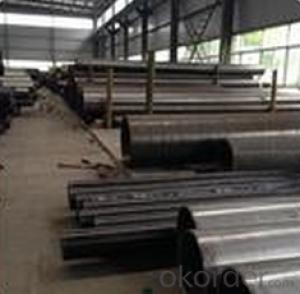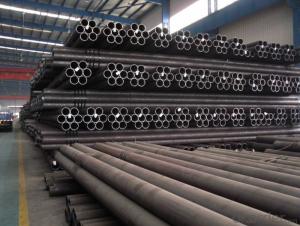Steel pipe for carbon seamless ,20#, cnbm
- Loading Port:
- Qingdao
- Payment Terms:
- TT OR LC
- Min Order Qty:
- 10 pc
- Supply Capability:
- 30 pc/month
OKorder Service Pledge
OKorder Financial Service
You Might Also Like
Quick Details
Thickness: 6 - 50 mm Section
Shape: Round,r
Outer Diameter: 33 - 600 mm
Secondary Or Not: Non-secondary
Application: Fluid Pipe
Technique: Hot Rolled,Hot Rolled,Cold Drawn,Hot Expanded Certification: API Surface Treatment: Beveled end or plain end or varnished as per buyer
Special Pipe: API Pipe Alloy Or Not: Non-alloy
Length: 6-12m or according to clients' requirements
Standard: BS 3059-2,JIS G3454-2007,GB 5310-1995,GB 3087-1999,GB/T 8163-1999,GB/T 8162-1999,GB 6479-2000,DIN 1629/3,DIN 2448,ASTM A106-2006,ASTM A53-2007,API 5CT,API 5L,BS,JIS,GB,DIN,ASTM,API
Certification & Standard | SGS & AISI |
Type | Cold Rolled |
Thickness | 0.14mm ~ 1.5mm |
Width | 10mm ~ 1240mm |
Length | As customers' requirements |
Surface finish | NO.2B/ NO.3/ NO.4/ HL/ 8K/ BA |
Chemical Composition (MT)% | (C) :≤0.12% (Si) :≤0.75% (Mn) :≤1.00% (P) :≤0.040% (S) :≤0.030% (Ni) :≤0.60%(Available to contain) (Cr) :16.00~18.00% |
Advantage | Good flexibility, Resistant to corrosion, Thermal Conductivity and lower thermal expansion. |
Application | l Be uesd in manufacturing kitchen ware field. l Auto exhaust parts, Heat exchanger, Washing machinery. l Interior/ Exterior decoration for building l Household Appliances or Appliance components. |
Market | Southeast Aisa, Mid East, Africa, Estern Aisa, Western Europe ,etc. |
Packing | Bundle package, Wooden case, Container or bulk, etc in export standard ;or as customers'requests |
- Q:What is the role of steel pipes in the transportation of petroleum products?
- Steel pipes play a crucial role in the transportation of petroleum products. These pipes are specifically designed to withstand the high pressure and extreme temperatures associated with the transportation of oil and gas. One of the main roles of steel pipes in this process is to provide a reliable and secure conduit for the transportation of petroleum products over long distances. They are used to create pipelines that span hundreds or even thousands of miles, connecting oil fields, refineries, and distribution centers. Steel pipes are preferred for this purpose due to their strength, durability, and resistance to corrosion. The high tensile strength of steel allows these pipes to withstand the immense pressure exerted by the petroleum products as they flow through the pipelines. Additionally, steel pipes have the ability to withstand extreme temperatures, ensuring the safe transportation of hot crude oil or refined petroleum products. Furthermore, steel pipes are highly resistant to corrosion, which is a critical factor given the corrosive nature of petroleum products. The pipes are often coated with protective materials, such as epoxy or polyethylene, to further enhance their resistance to corrosion. This helps to prevent leaks or ruptures that could lead to environmental damage or safety hazards. Steel pipes also offer cost-effective and efficient transportation of petroleum products. They have a smooth interior surface, which reduces friction and allows for a more efficient flow of oil or gas. This, in turn, helps to minimize energy consumption and maximize the throughput of the pipeline system. In summary, the role of steel pipes in the transportation of petroleum products is to provide a reliable, secure, and efficient means of transporting oil and gas over long distances. They are designed to withstand high pressure, extreme temperatures, and corrosion, ensuring the safe and efficient delivery of petroleum products from production sites to refineries and distribution centers.
- Q:What is the pressure rating of steel pipes?
- The pressure rating of steel pipes varies depending on its size, wall thickness, and the type of steel used. It can range from a few hundred pounds per square inch (psi) for smaller pipes to several thousand psi for larger ones.
- Q:What is the cost of steel pipes compared to other piping materials?
- The cost of steel pipes can vary depending on factors such as size, thickness, and grade. However, generally speaking, steel pipes tend to be more expensive than other piping materials such as PVC or copper. This is due to the durability, strength, and longevity of steel pipes, making them a preferred choice for various industrial and construction applications.
- Q:What are the different types of steel pipes available?
- There are several types of steel pipes available, including seamless pipes, welded pipes, galvanized pipes, and stainless steel pipes.
- Q:Can steel pipes be used for oil and gas well production?
- Yes, steel pipes can be used for oil and gas well production. Steel pipes are commonly used in the oil and gas industry due to their strength, durability, and resistance to corrosion. They are able to withstand high pressure and extreme temperatures, making them suitable for transporting and extracting oil and gas from wells.
- Q:How are steel pipes used in the construction of coal-fired power plants?
- Steel pipes are used in the construction of coal-fired power plants for various purposes such as transporting coal and water, circulating fluids, and carrying high-pressure steam. They are commonly used in the boiler and piping systems, including the coal handling system, ash handling system, and cooling water system. Steel pipes provide durability, strength, and resistance to high temperatures and pressures, making them essential components in coal-fired power plant construction.
- Q:How are steel pipes coated for underground applications?
- Steel pipes are typically coated for underground applications using a variety of methods, including but not limited to hot-dip galvanizing, epoxy coating, and polyethylene wrapping. These protective coatings help prevent corrosion, increase the lifespan of the pipes, and ensure their reliability in underground environments.
- Q:How do steel pipes handle high-pressure applications?
- Steel pipes are able to handle high-pressure applications due to their inherent strength and durability. The material properties of steel, such as its high tensile strength and resistance to deformation, allow it to withstand the intense pressure exerted on the pipes. Additionally, steel pipes can be manufactured with thick walls and seamless construction, further enhancing their ability to handle high-pressure environments. Overall, the robust nature of steel pipes makes them a reliable choice for various industrial applications requiring high-pressure resistance.
- Q:How are steel pipes transported?
- Steel pipes are typically transported using various methods, including trucks, trains, and ships. They are often loaded onto flatbed trucks or railcars for land transportation, while larger quantities are transported by bulk carriers or container ships for overseas shipping. The pipes are secured with straps or chains to ensure safe and stable transport, and they may also be packed in bundles or placed in specially designed containers to protect them from damage during transit.
- Q:Can steel pipes be insulated for thermal efficiency?
- Yes, steel pipes can be insulated for thermal efficiency. Insulating steel pipes helps to reduce heat loss or gain, ensuring better energy efficiency and cost savings. The insulation material, such as foam or mineral wool, is typically wrapped around the pipe to create a barrier that minimizes heat transfer.
1. Manufacturer Overview |
|
|---|---|
| Location | |
| Year Established | |
| Annual Output Value | |
| Main Markets | |
| Company Certifications | |
2. Manufacturer Certificates |
|
|---|---|
| a) Certification Name | |
| Range | |
| Reference | |
| Validity Period | |
3. Manufacturer Capability |
|
|---|---|
| a)Trade Capacity | |
| Nearest Port | |
| Export Percentage | |
| No.of Employees in Trade Department | |
| Language Spoken: | |
| b)Factory Information | |
| Factory Size: | |
| No. of Production Lines | |
| Contract Manufacturing | |
| Product Price Range | |
Send your message to us
Steel pipe for carbon seamless ,20#, cnbm
- Loading Port:
- Qingdao
- Payment Terms:
- TT OR LC
- Min Order Qty:
- 10 pc
- Supply Capability:
- 30 pc/month
OKorder Service Pledge
OKorder Financial Service
Similar products
New products
Hot products
Related keywords































